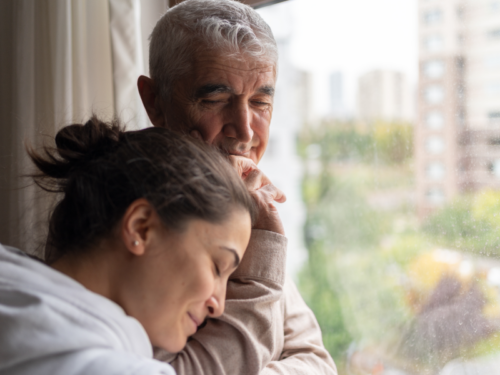
Table of Contents
Yes, Childhood Trauma Can Still Impact You as an Adult

Written By: Ashley Laderer

Clinically Reviewed By: Clary Figueroa
September 26, 2024
5 min.
Are you a survivor of childhood trauma? If so, it’s important to understand the impacts of childhood trauma in adulthood. Read on to learn about how trauma impacts you and how to treat trauma with therapy.
Learn more about our Clinical Review Process
Table of Contents
Childhood trauma doesn’t stay in childhood. The impacts of trauma stick with you, and you might not even realize how deeply affected you are, especially if you’ve never processed it. Even years later in adulthood, unresolved, repressed trauma can affect your mental health, relationships, and views of yourself and others –– whether you realize it or not.
If you experienced childhood trauma, you’re not alone. 61% of US adults experienced at least one adverse childhood experience (ACE) while growing up, according to national data. ACEs are negative, traumatic events that happen before age 18. Furthermore, 1 in 6 US adults experienced four or more different ACEs. Unfortunately, these adverse experiences result in a higher risk for mental and physical health complications later in life. Here’s what you need to know about the impact of childhood trauma on adults and how to heal.

Start healing from childhood trauma today
We help adults process childhood trauma with virtual intensive therapy.
Effects of childhood trauma on adults
Childhood trauma manifests in three primary categories — all of which can impact people into adulthood. According to Charlie Health Clinical Supervisor Sarah Lyter, LCPC, MA, the main kinds of childhood trauma are as follows:
- Child abuse, including emotional abuse, physical abuse, or sexual abuse
- Child neglect, which is when a child’s basic physical or emotional needs aren’t met
- Household dysfunction, including witnessing domestic violence or having a parent or parents with severe mental illness or substance abuse
Regardless of the type of childhood trauma or adverse childhood experiences you endured, the effects can linger for years in varying degrees of severity. “The effects of childhood trauma can be very profound and very long-lasting,” Lyter says. “They typically impact our emotional, mental, and social functioning in a lot of different ways, especially in relationships.” It’s also common for childhood trauma survivors to struggle with emotional regulation, self-worth, and self-esteem, she adds.

On top of all this, trauma results in physical changes to the brain. These changes are even more significant if the trauma happens in childhood while the brain is still growing and developing. Research shows that trauma impacts the following brain regions:
- The prefrontal cortex, which is involved in mood and emotional regulation
- The hippocampus, which is associated with learning
- The amygdala, which is key to the fear response
Additionally, the American Psychological Association (APA) reports that these brain changes may be accompanied by other signs of biological aging, ultimately causing childhood trauma survivors to biologically age faster than those who have not experienced childhood trauma. These changes result in long-lasting changes and may be associated with symptoms of mental health conditions like post-traumatic stress disorder (PTSD) and even physical health conditions.
What conditions are linked to childhood trauma?
Everyone is different, and childhood trauma in adults can present in many different ways. However, research shows that adverse childhood experiences are major risk factors for various mental health conditions, including:
- PTSD, including complex post-traumatic stress disorder (C-PTSD)
- Anxiety disorders
- Major depressive disorder (MDD)
- Bipolar disorder
- Substance use disorder
- Borderline personality disorder
Additionally, although unhealthy, insecure attachment styles are not mental health conditions, they can absolutely result in difficulties in adult relationships. Attachment theory is based on the idea that the relationships you have with your primary caregivers when you’re growing up shape the way your relationships will be in adulthood, especially romantic relationships. Lyter says childhood trauma is often linked to anxious attachment, avoidant attachment, or disorganized attachment. Insecure attachment styles are associated with emotional dysregulation, difficulty trusting others, and fear of intimacy, she adds.
Lastly, trauma doesn’t just affect mental health –– it can also impact physical health. Adverse childhood experiences have been linked to increased risk of physical health struggles such as:
- Respiratory diseases
- Kidney disease
- Heart disease
- Diabetes
- Obesity
- Irritable bowel syndrome (IBS)
Addressing repressed childhood trauma and working through traumatic experiences with a mental health professional can help reduce the impact that these adverse experiences have on your overall health and well-being.
Treatment for childhood trauma in adults
The importance of seeking treatment for unresolved childhood trauma is paramount, Lyter says. If your trauma is affecting your mental health, especially if you’re having trouble functioning in your day-to-day life or you feel like you aren’t enjoying life, it’s time to seek help. Effective trauma treatment can be truly life-changing. Here are six helpful therapy modalities for trauma:
1. Cognitive behavioral therapy (CBT)
CBT is a common approach for treating a variety of mental health conditions, including trauma-related conditions. It helps you learn how your thoughts, feelings, and behaviors are interconnected, allowing you to create healthier thought patterns and behaviors. A specific form of CBT called trauma-focused cognitive behavioral therapy (TF-CBT), is especially useful for trauma, Lyter says. Although it’s developed for kids and teens, its principles can be useful for adults, too.
2. Prolonged exposure therapy (PE)
PE is a form of CBT used to treat PTSD. It’s an approach that gradually exposes you to your trauma triggers, including traumatic memories, places, or situations. It’s common for trauma survivors to avoid anything that reminds them of their trauma, but this ultimately fuels anxiety and reinforces danger in your brain. Exposure therapy aims to counteract this.

3. Eye movement desensitization and reprocessing (EMDR)
EMDR was developed specifically for PTSD treatment. A therapist will guide you through some type of bilateral stimulation, such as left-right eye movement, while you think about the traumatic event or series of adverse experiences you had as a child. This process changes how your brain stores and processes these memories. Ultimately, EMDR desensitizes you to your trauma, Lyter says.
4. Somatic experiencing therapy
Many people believe trauma is stored in the body, where it can continue to fester and result in more symptoms. Somatic therapy is a body-centered therapy that’s great for people who experience physical symptoms, chronic pain, and dissociation, says Lyter. It uses a mind-body approach to help you heal and address unresolved trauma.
5. Attachment-based therapy
This form of therapy helps you dive into your early childhood relationships and the issues that are associated with them, which, in turn, helps you heal your attachment wounds, says Lyter. Developing a more secure attachment style through therapy can help if you struggle with interpersonal relationships in adulthood.
6. Dialectical behavior therapy (DBT)
DBT teaches actionable skills to address symptoms that come along with trauma, such as emotional dysregulation, trouble tolerating distress, self-destructive behaviors, and relationship struggles, Lyter says. DBT will help you learn how to regulate emotions, tolerate distress, and have healthier interpersonal relationships.

How Charlie Health can help
If you’re a childhood trauma survivor struggling with your mental health, Charlie Health is here to help. Our virtual intensive Outpatient Program (IOP) provides personalized mental health treatment for individuals with serious mental health conditions. Our clinicians incorporate evidence-based therapies into individual counseling, family therapy, and group sessions. All of Charlie Health’s clinicians are trauma-informed and well-equipped to help you process the emotions surrounding your unresolved trauma in a supportive, safe space. Fill out the form below or call us to start your recovery journey today.



